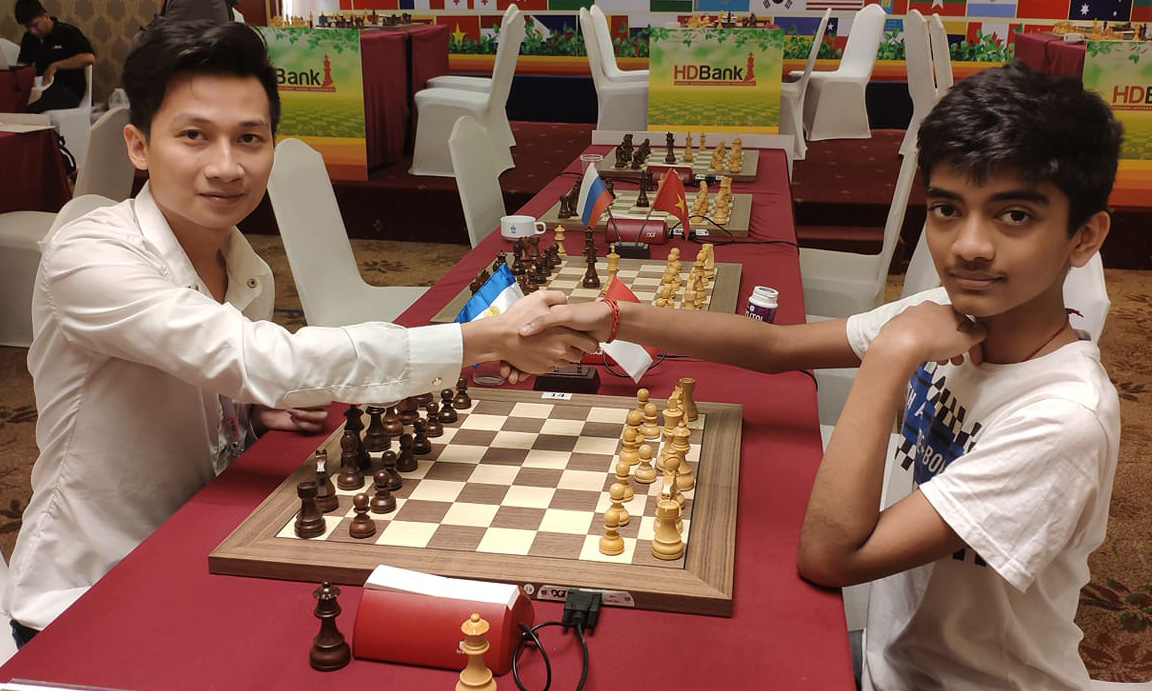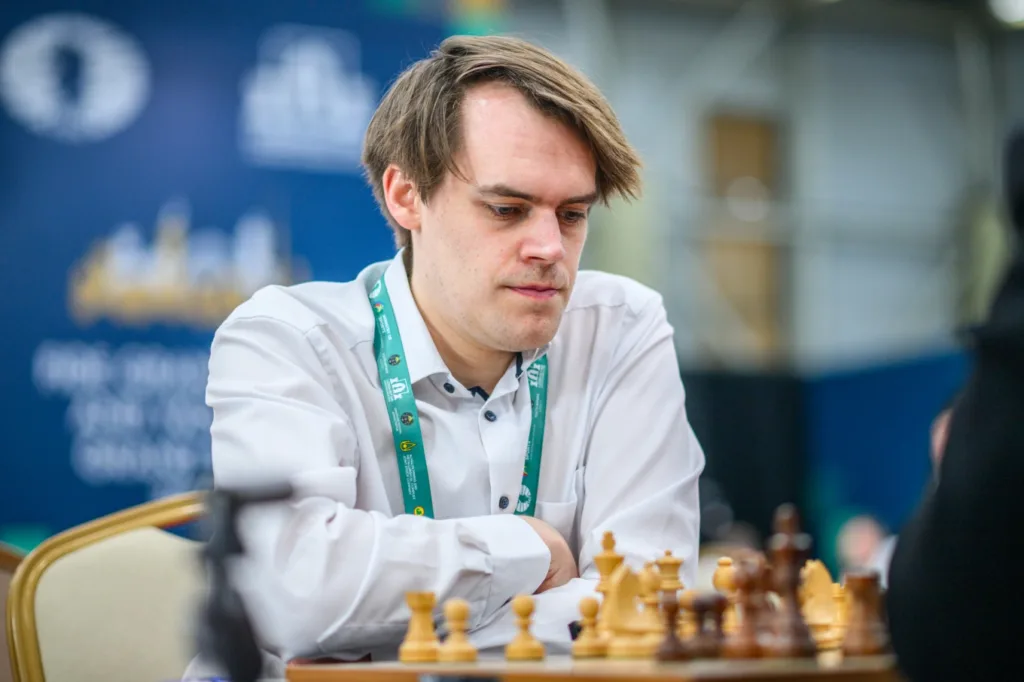On September 15, 2025, in the closing moments of the FIDE Grand Swiss in Samarkand, German grandmaster Matthias Bluebaum secured a career-defining achievement. By finishing second in one of the most grueling tournaments in the chess calendar, the 28-year-old clinched a coveted spot in the 2026 Candidates Tournament — the eight-player event that decides who challenges reigning world champion Dommaraju Gukesh.
For Bluebaum, who has often described himself as a reluctant professional, the journey to this stage has been anything but straightforward. It has been marked by steady growth, brushes with greatness, moments of doubt, and even flashes of self-deprecation. Yet now, after years of persistence, he stands on the threshold of world championship contention.
The Lucky Break in Round 10
If there was a single moment that summed up Bluebaum’s path to the Candidates, it came in the penultimate round of the Grand Swiss 2025. Paired against fellow German Vincent Keymer, in the King’s Indian Attack opening, Bluebaum played what he himself described as “a miracle of bad chess.”
“I just blundered like a complete idiot and I should have lost,” he admitted in his post-game interview. “It’s completely ridiculous that I got a draw. Like, I was already hating my life because I thought I had nothing to play for anymore. But then he blundered back. I was insanely lucky.”
That result, a draw from the jaws of defeat, kept Bluebaum in contention heading into the final round. He was candid enough to admit it wasn’t resilience that saved him — “to be honest, I basically gave up and I still got lucky” — but fortune. Still, luck alone does not explain why a player ranked outside the world’s top 50 has earned a place among the game’s elite.
From Lemgo to the World Stage
Born on April 18, 1997, in Lemgo, North Rhine-Westphalia, Matthias Bluebaum grew up in a chess-loving family. His father, Karl-Ernst, was a multiple-time regional champion, and two of his three sisters competed in top-level girls’ championships in Germany. Surrounded by pieces and boards at home, Bluebaum learned the game at six and entered structured training by eight.
At 12, he became part of Germany’s famed Prinzengruppe (“Princes’ Group”), a quartet of prodigies nurtured by national junior coach Bernd Vökler. Alongside Rasmus Svane, Dennis Wagner, and Alexander Donchenko, Bluebaum was expected to reach grandmaster status. The group delivered: by 2016, all four were grandmasters, fulfilling Vökler’s vision of turning “princes” into “kings.”
By 18, Bluebaum himself had achieved the GM title. His style was solid, principled, and less flamboyant than contemporaries like Magnus Carlsen or Alireza Firouzja, but it earned him steady progress on the international circuit.
Balancing Studies and Chess
What set Bluebaum apart from many peers was his hesitation to fully embrace professional chess. He excelled academically, skipping a grade in school and completing his Abitur at 17. He went on to study physics and mathematics at Bielefeld University, later pursuing a master’s degree in math.
In a 2020 interview, when he briefly became Germany’s top-rated player, Bluebaum confessed, “It’s not clear to me that I’ll become a chess professional. For me, the most important thing is that I’m getting my master’s degree. But of course, I don’t want to quit playing chess either.”
That ambivalence reflected a larger cultural reality: in Germany, unlike in Russia or India, chess rarely promises a sustainable career. Bluebaum himself admitted he was unwilling to live “out of a suitcase” like many full-time professionals. Instead, he played selectively, balancing his academic pursuits with national and international competitions.
The Breakthrough Years
Despite those doubts, Bluebaum accumulated major successes. In 2016, he won the Grenke Chess Open and the Xtracon Chess Open. That same year, he delivered a critical win at the Chess Olympiad against Estonia, a result that indirectly gave the United States the gold medal.
The true breakthrough came in 2022, when he won the European Individual Chess Championship in decisive style. He repeated the feat in 2025, becoming a two-time continental champion and one of Germany’s most decorated modern players.
These results elevated him to the role of standard-bearer for German chess. By 2020, he had overtaken Donchenko to briefly hold the country’s top Elo ranking. His consistency and maturity gave Germany, long in search of a world-class contender, fresh hope.
The Grand Swiss 2025: The Defining Moment
Qualification for the Candidates is notoriously difficult. Only eight players make the cut: the previous world championship loser, the top finishers in the World Cup, the Grand Swiss, and a few rating-based slots. For Bluebaum, the Grand Swiss represented his last realistic path. Bluebaum’s qualification is another reminder of how brutal the Candidates cycle can be.
His tournament was a mix of steady play, grit, and fortune. The near-loss to Keymer in Round 10 was a turning point. “I was in shock that I actually got a draw,” he recalled. “For one and a half hours, I was sure I was going to lose.”
But in the final round, Bluebaum steadied himself. A composed performance secured him second place behind Anish Giri, earning him a golden ticket to the Candidates. At 28, with a FIDE rating of 2671, he had entered a new echelon.
Qualified to the Candidates without a coach or a second
For Matthias Bluebaum, the silver medal at the 2025 FIDE Grand Swiss was more than just a podium finish. It was his ticket to the 2026 Candidates — and a career breakthrough he admits he never fully expected.
“I’m extremely happy, still trying to realize I actually qualified,” Bluebaum said after the closing ceremony. “It’s such a huge success and I didn’t expect it at all. The tournament just went very well, and suddenly I was always at the top. In the end, it was enough to just make some draws — though all of them were very tough.”
The 28-year-old German was candid about the role of fortune in his run, especially in his dramatic draw against compatriot Vincent Keymer. “I was extremely lucky. It’s a pity for Vincent, but I hope he also manages to qualify, whether through the World Cup or the next Candidates. He definitely belongs there,” Bluebaum noted.
Asked about his toughest games, Bluebaum highlighted both Keymer and 15-year-old Abhimanyu Mishra. “Vincent was the hardest — that game was so tough and I needed a lot of luck. But Mishra also impressed me a lot. He played amazingly well and still had chances to qualify if he had won in the final round.”
His favorite victories came against India’s rising stars Praggnanandhaa and Arjun Erigaisi. “Those were my highest-rated wins ever. I didn’t play perfect, but I’m proud I managed to convert when they made mistakes.”
What makes Bluebaum’s qualification even more remarkable is that he achieved it without a coach or second. “I was completely on my own for this tournament. My father was my first coach, and later Matthias Koellner helped me, but in recent years I’ve mostly worked alone. We have a national coach in Germany, Jan Gustafsson, but for events like this we prepare by ourselves.”
Now, with the Candidates on the horizon, Bluebaum knows he’ll need to build a team and secure sponsorships to compete with the world’s best. “Of course, sponsorship can always help. For now, I just need a few weeks to let it sink in. Then I’ll start thinking about how to prepare properly.”
Style of Play: Solid, Classical, and Patient
Bluebaum’s approach to the game reflects his personality: cautious, methodical, and self-critical. From his youth, he favored classical openings — the French and Slav with Black, and the 1.d4 repertoire with White. Critics sometimes described him as “predictable,” but he has slowly broadened his arsenal.
His strengths lie in endgame technique, strategic patience, and an ability to capitalize on opponents’ mistakes. He may lack the explosive dynamism of Carlsen or Hikaru Nakamura, but he embodies consistency. That reliability, paired with his resilience in long Swiss events, explains his success in European championships and now the Grand Swiss.
The Road Ahead: Can Bluebaum Compete with the Elite?
The Candidates Tournament is a different beast. He will face players like Caruana, Giri, Nakamura (and probably Praggnanandhaa) – seasoned super-grandmasters with 2750+ ratings. At 2671, Bluebaum enters as one of the lowest seeds.
Yet underestimating him would be a mistake. Twice European champion, with a career built on patience and incremental gains, he has a knack for thriving when expectations are low. Moreover, his humility and honesty may be assets in high-pressure situations. As he himself noted after his lucky escape against Keymer, “That’s life.”
A German Hope
For German chess, Bluebaum’s qualification carries symbolic weight. Since the days of Emanuel Lasker, the country has rarely produced a world championship contender. Arkadij Naiditsch briefly flirted with the elite before switching federations to Azerbaijan, but Germany has long lacked a consistent presence at the Candidates level.
Bluebaum changes that. At 28, he represents both the fruition of the Prinzengruppe experiment and a new chapter for German chess. His run may inspire the next generation, much as Carlsen’s rise in Norway transformed the game’s popularity.

I’m Xuan Binh, the founder of Attacking Chess, and the Deputy Head of Communications at the Vietnam Chess Federation (VCF). My chess.com and lichess rating is above 2300. Send me a challenge or message via Lichess. Follow me on Twitter (X) or Facebook.

